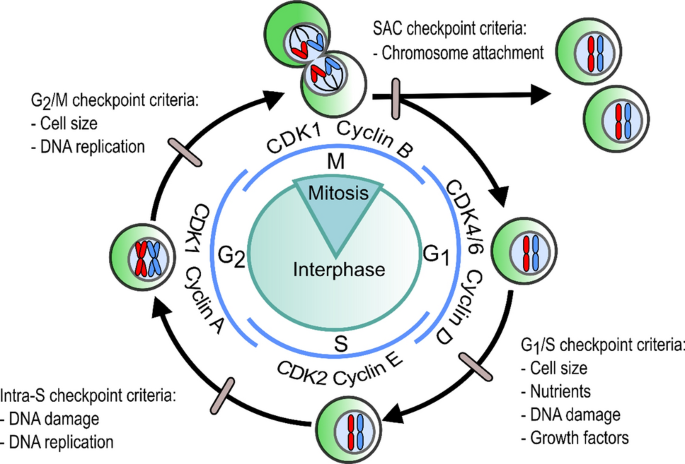Table of Contents
I. Introduction
- The cell cycle is the sequence of events that a cell goes through as it grows and divides.
- The regulation of the cell cycle is essential for proper growth and development of multicellular organisms.
- Dysregulation of the cell cycle can lead to various diseases, including cancer, where cells divide uncontrollably.
II. Cyclin-dependent kinases (CDKs)
- The progression of the cell cycle is controlled by a family of enzymes called Cyclin-dependent kinases (CDKs).
- CDKs are activated by binding to regulatory subunits called cyclins.
- The different cyclin/CDK complexes control the different stages of the cell cycle.
III. Cyclin-dependent kinase inhibitors (CKIs)
- The activity of CDKs is tightly regulated by a family of proteins called Cyclin-dependent kinase inhibitors (CKIs).
- CKIs can inhibit the activity of CDKs by binding to them and preventing their binding to cyclins.
- The most well-known CKIs are the Ink4 and Cip/Kip family of proteins.
IV. Retinoblastoma protein (Rb)
- The retinoblastoma protein (Rb) is a tumor suppressor protein that controls the cell cycle by inhibiting the activity of the E2F family of transcription factors.
- Rb is phosphorylated by CDKs, which releases E2F and allows the transcription of genes required for S-phase progression.
- Loss of Rb function has been linked to various types of cancer.
V. Tumor protein p53 (p53)
- The tumor protein p53 (p53) is a transcription factor that plays a crucial role in controlling the cell cycle and responding to DNA damage.
- p53 can arrest the cell cycle at the G1 checkpoint to allow for DNA repair, or it can trigger apoptosis if the damage is irreparable.
- Loss of p53 function has been linked to various types of cancer.
VI. Conclusion
- The regulation of the cell cycle is a complex process that involves a delicate balance of various molecular interactions, which ensure proper timing and coordination of the various events.
- Understanding the molecular basis of the cell cycle regulation is essential for the development of therapies for various diseases, including cancer, where cell cycle regulation is often disrupted.
